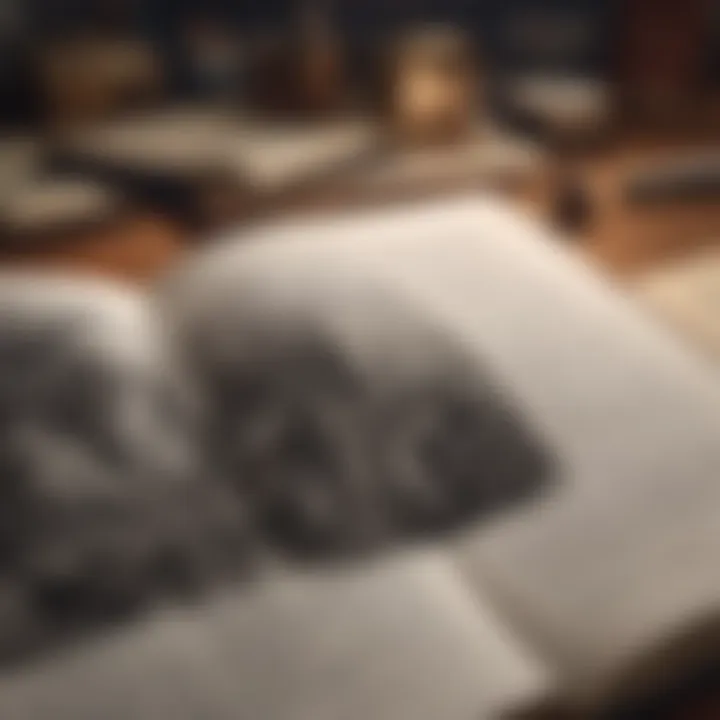Exploring Influential History Books and Their Impact


Intro
History books are not just inventories of dates and events; they're intricate tapestries that weave together the threads of human experience, wisdom, and mistakes. In today's fast-paced world, where sound bites often overshadow substance, taking a moment to delve into well-crafted historical narratives can offer both solace and perspective. Whether you're a student searching for deeper insights, an educator honing your curriculum, or just a curious reader, this article will provide a roadmap through some of the most notable history books that have enriched our understanding of the past.
By examining key works across different eras, we aim to unearth not only the stories they tell but also the invaluable lessons they impart. Throughout this narrative, we'll explore the intricate contexts in which these texts were written, shedding light on the motivations and environments of their authors. Are you ready to embark on this enlightening journey into the annals of history? Let's dive right in!
Key Lessons from the Book
Understanding historical narratives goes beyond surface-level facts. For each book we discuss, there are lessons that resonate even in contemporary life.
Lesson Overview
Each history book serves as a mirror reflecting both the triumphs and trials of humanity. For instance, "Guns, Germs, and Steel" by Jared Diamond illustrates how geography and environment played pivotal roles in shaping societies. One key takeaway here is the significance of understanding context. Recognizing the forces that drive societal evolution can illuminate current global disparities and challenges.
In addition to context, many of these texts impart fundamental ethical lessons. Another example is "The Diary of a Young Girl" by Anne Frank. This poignant account not only captures the brutal realities of war but also embodies resilience and hope—an everlasting lesson about the human spirit's ability to endure under the most trying circumstances.
Practical Applications
These lessons aren’t confined to the pages of history books; they inform our daily lives.
- Critical Thinking: Engaging with historical narratives cultivates critical thinking. For example, analyzing differing perspectives in "A People's History of the United States" by Howard Zinn fosters an understanding of the multifaceted nature of truth.
- Empathy Development: Reading the personal experiences detailed in "The Book Thief" by Markus Zusak allows readers to empathize with individuals from different backgrounds and times, fostering a more inclusive worldview.
- Informed Citizenship: Understanding history equips individuals with the tools to navigate contemporary political landscapes responsibly, as illustrated in "The Origins of Totalitarianism" by Hannah Arendt. It encourages vigilance and engagement against the repeated patterns of oppression and tyranny.
Author Insights
At the heart of these influential history books lie the authors’ insights, shaped by their backgrounds and the times they lived in.
Author Background
Consider Yuval Noah Harari, author of "Sapiens: A Brief History of Humankind". Learning about his background as a historian and philosopher from Israel adds depth to his analysis of humanity's evolution from the Stone Age to modern times. His unique educational path influences the way he intertwines scientific insights with philosophical reflections throughout the narrative.
Key Themes Explored
The themes explored by these authors often arise from their personal experiences and societal observations. Take "The Warmth of Other Suns" by Isabel Wilkerson, which examines the Great Migration. Wilkerson’s meticulous storytelling underscores themes of struggle for dignity and identity, revealing a powerful narrative of hope and resilience.
"History is not just about what happened; it's about understanding why it happened and how it matters today."
By engaging with these texts, readers can gain a deeper understanding of their own cultural contexts, fostering a society that values reflection and informed discourse.
As we unravel further sections, we’ll continue to delve into different works that have not only shaped public consciousness but also provided timeless lessons. History does not remain stagnant; it lives on in our actions, choices, and the books we read.
Prolusion to History Literature
History literature serves as a vital bridge connecting our present to the labyrinth of our past. These texts do much more than recount events; they illuminate the human experience across different times and cultures. In exploring notable history books, readers can glean valuable insights into societal values, norms, and struggles that have shaped our world. As such, an engaging introduction to this topic lays the groundwork for understanding the subsequent discussions in this article.
The Role of History Books in Understanding Human Experience
Books on history offer more than dates and facts; they act as mirrors reflecting the complexities of human nature. They provide context for the decisions made by individuals and societies, allowing readers to see how past actions resonate with current events. One could argue that history books are like travel guides through time, leading readers to places that shaped civilization's journey, both glorifying achievements and exposing failures.
- Knowledge Expansion: Reading history can stretch your worldview, making it rich and nuanced.
- Critical Thinking: Engaging with different narratives fosters critical thinking, nudging readers to question what they believe and what they know.
- Empathy Building: Diving into the experiences of people from different eras cultivates empathy and understanding, essential in today’s global society.
"History is a vast early warning system."
- Norman Cousins
This underscores how exploring historical literature can equip us with the wisdom of the past, better preparing us for future endeavors.
Distinguishing Between History and Historical Fiction
While both history and historical fiction share common threads, they serve distinct purposes and cater to different tastes. History books rely on factual accounts, often backed by meticulous research and primary sources. They aim to present an accurate portrayal of events, guiding readers through a factual understanding of the past.
In contrast, historical fiction takes creative liberties, weaving imaginative narratives around actual events or figures. It aims to bring history to life, making it emotionally engaging and accessible. Readers might find themselves immersed in a vividly painted world, yet this genre walks a tightrope, at times blending fact with fiction rather liberally.
- Purpose: History books strive for accuracy; historical fiction aims for narrative depth and emotional engagement.
- Source Material: The former relies on verified facts; the latter draws from creativity, reimagining experiences that may have occurred.
Acknowledging these differences allows readers to approach each type of literature with the right mindset, appreciating history books for their insights and historical fiction for their artistic interpretations.
In doing so, one can better appreciate the landscape of human experiences that these works convey.
The Evolution of Historical Writing
Understanding the evolution of historical writing is crucial for grasping how we've come to interpret human endeavors across time. This trajectory not only reflects statistical shifts but also encapsulates the changing paradigms of thought, societal values, and the methods used to record impactful events. The roots of historical writing could be traced back to the early chronicles, where events were documented primarily for the purpose of coherence and preservation. As civilizations evolved, so too did the complexities of these narratives, leading to a literature that is as rich and varied as the histories it recounts. This evolution illustrates how history books enable us to dissect and dissect societal workings, shaping our worldview while enhancing our understanding of the past.
Chronicles of Ancient Historians


The chronicles produced by ancient historians stand as the cornerstones of historical writing. Think of figures like Herodotus and Thucydides whose works not only documented events but also introduced the concept of questioning motives and interpretations.
- Herodotus, often dubbed the 'Father of History', chronicled the Greco-Persian wars. He didn’t just record facts; he wove tales that captured the social and cultural essence of the time. For instance, his accounts of the various customs and beliefs of people from different regions have shaped our understanding of ancient civilizations.
- Thucydides, in contrast, focused more on a strict, pragmatic analysis. His comprehensive record of the Peloponnesian War evaluated power dynamics, emphasizing the political context surrounding military conflicts.
These early accounts set the stage for an analytical approach that historians still find valuable. His clarity and emphasis on accuracy created a foundation that later historians would build upon. By situating particular events within broader societal trends, ancient historians offered readers a method to connect disparate occurrences and draw meaning from them.
The Impact of the Renaissance on Historical Narrative
The Renaissance was a pivotal period that profoundly influenced historical writing. It instigated a revival of classical learning and emphasized humanism, thus shifting the focus of history from a mere recording of events to incorporating human experiences and perspectives. This cultural movement enabled historians to reevaluate previous works, bringing in new methodologies that highlighted critical thinking and skepticism towards sources.
During this era, Niccolò Machiavelli emerged as a notable figure, advocating for the understanding of history as a guide for statecraft. His emphasis on realistic political narratives led to a more pragmatic lens through which history was examined. As more individuals began to engage in historical pursuits, narratives gained depth, allowing for the exploration of themes such as morality, governance, and the human condition.
The Renaissance’s impact extended beyond methodology; it led to the broader dissemination of historical texts. The advent of the printing press made influential works more accessible, allowing for wider public engagement with history. As a result, historical writing transitioned from exclusive circles into the hands of the general populace, fostering a richer dialogue about the past.
"History is the witness that testifies to the passing of time; it is the storyteller that reminds us of what once was, urging us to learn and engage with the lessons of our collective journey."
This shift not only democratized access to historical knowledge but also invited ongoing reflection and critique of past narratives. Consequently, the evolution of historical writing is not just a change in style or methodology; it's about how we, as society, come to understand our shared human experience.
Iconic History Books and Their Authors
History books serve as windows into the past, revealing the intricate tapestry of human experience. They capture pivotal moments and influential figures, allowing readers to delve into eras long gone. In this article, we look at three critical authors, Thucydides, Herodotus, and Edward Gibbon, whose works stand the test of time for their unique insights and coverage of historical events. Each of these authors has contributed not just a narrative but a framework for understanding how history is recorded and interpreted.
Thucydides and 'History of the Peloponnesian War'
Context of the Peloponnesian War
Thucydides's work, focused on the Peloponnesian War, is more than just a historical account. It's a profound exploration of politics, loyalty, and the nature of power. The conflict between Athens and Sparta transformed the Greek world, providing a rich backdrop for Thucydides’s inquiries. He wrote not just to recount the events but to provide a deeper understanding of the human condition, revealing the motivations and consequences of political actions. This context is a key characteristic of Thucydides' work, illustrating how personal and political decisions shape society. It's often regarded as a beneficial choice for anyone eager to comprehend the dynamics of conflict, making it essential for this examination of history literature.
One unique feature is the way Thucydides intersperses narrative with analysis, offering readers both a storyline and the philosophical underpinnings behind decisions made during the war. His approach allows contemporary readers to draw parallels with current geopolitical struggles, making his work timeless.
The Value of Primary Sources
In any historical inquiry, the use of primary sources is indispensable. Thucydides himself prides on being a primary source, offering firsthand accounts of the war's events, which further solidifies the importance of his text. By utilizing direct testimonies and official documents, he paints a reliable picture of the past.
The value of primary sources lies in their authenticity. They allow historians and casual readers alike to engage directly with the materials from which history is woven. Thucydides provides a rich collection of speeches and events that stress the moral dilemmas seen in political discourse. This characteristic is vital for a comprehensive understanding of historical debates, which is why this article emphasizes his text as a crucial resource.
However, reliance on personal experience and bias can also be a double-edged sword. Thucydides's choice of events and his interpretations might reflect his preferences, which calls for careful consideration when approaching his conclusions.
Herodotus and the Birth of Historical Inquiry
The Persian Wars as a Case Study
Herodotus, often dubbed the 'Father of History,' set the stage for historical writing with his accounts of the Persian Wars. His narrative is not just a battle chronicle; it encompasses cultural interactions, examination of customs, and poignant reflections on the human spirit. The war between the Persian Empire and the Greek states provides a rich case study that illustrates the clash of civilizations.
Herodotus’s examination here is significant because it includes diverse perspectives, from both Greek and Persian viewpoints, creating a more nuanced understanding of the conflict. This feature makes his work a valuable educational tool. It encourages readers to appreciate the complex layering of narratives in historical literature.
However, one must also recognize that his accounts venture into story-telling, sometimes bordering on the anecdotal. While this serves to engage the audience, it raises questions about factual accuracy and reliability, which can complicate his contributions to history.
The Concept of 'Logos'
Integral to Herodotus's narrative is the concept of 'Logos,' or reasoned discourse. This idea lays the groundwork for analyzing historical events not merely based on facts but through the lens of human motives and societal influences. Herodotus's exploration of 'Logos' invites readers to question why events unfold as they do, rather than simply what happened.
The importance of this concept in the article's scope is profound. It provides a framework for understanding historical inquiry, emphasizing the need for interpretation alongside factual recounting. By grounding history in rational discourse, Herodotus’s work remains immensely relevant for readers seeking a deeper understanding of cause and effect in human actions.
Yet, it’s essential to wield this concept judiciously; 'Logos' can easily lead to subjective interpretations that could skew historical narratives if not balanced with solid evidence.
Edward Gibbon's 'The Decline and Fall of the Roman Empire'
Critical Analysis of Gibbon's Arguments
Edward Gibbon's monumental work examines the various forces that contributed to the Decline and Fall of the Roman Empire. Gibbon's critical analysis of these arguments is noteworthy for its depth and insight into social, economic, and military factors influencing Roman society. He discusses everything from the effects of corruption and moral decay to external pressures from invading forces.
One of the key characteristics of Gibbon's writing is his stylistic elegance combined with rigorous scholarship. His ability to weave narrative with analysis is a beneficial aspect that has captivated historians and scholars alike. His work not only informs readers of events but also encourages them to dissect the layers of causality and consequence.
However, Gibbon's perspective has faced critiques for its Eurocentric view, which can overshadow the complexity of the Empire's interactions with other cultures. This raises important considerations regarding bias in historical interpretation.
Influence on Future Historiography
Gibbon has left an indelible mark on future historiography. His approach set the standard for examining historical change, emphasizing a multi-faceted analysis that influences countless historians after him. His narrative style inspires others to explore historical accounts critically, focusing on broader questions of decline and the potential for recovery.
The importance of Gibbon’s influence in this article cannot be overstated. His ability to synthesize information and present a compelling narrative makes his work not just a study of the past, but also a confluence for modern thought on history. Readers can glean lessons on how to approach complex historical narratives through Gibbon’s lens.


Conversely, considering his biases and limitations is vital for a fresh perspective on historiography, ensuring that the discourse around his work remains dynamic and relevant.
Themes in Historical Literature
Understanding the themes in historical literature is essential as they serve as the lenses through which we interpret human events and societal evolution. These themes often reflect underlying motivations, conflicts, and resolutions that are crucial for grasping the complexities of history. By exploring these topics, readers gain insight not only into the past but also into the influences that shape modern society. Historical literature is a mirror — it reflects our cultural values and the dynamics of human relationships across different times and places. The exploration of such themes provides avenues for critical thinking and self-reflection, making history not just a collection of dates and events but a living narrative.
Power and Governance
Relationships Between Rulers and the Ruled
The relationship between rulers and the ruled is a central theme in historical literature, showcasing power dynamics that have been pivotal throughout human history. This particular aspect illustrates how authority is both constructed and challenged, varying widely between oppressive regimes and democratic societies. A key characteristic of these relationships is the intricate balance of power; when rulers act out of self-interest, they often alienate their subjects, leading to revolts and societal shifts. Conversely, leaders who recognize the needs of the populace tend to foster loyalty and prosperity.
The benefit of focusing on this theme in history literature lies in its universality. It emphasizes how the struggles for power can be traced through different cultures and epochs. For instance, the cycles of rise and fall of empires, as recounted in books like The History of the Peloponnesian War by Thucydides, profoundly demonstrate these dynamics.
However, this thematic exploration also presents disadvantages. It can lead to oversimplification, where complex societies are reduced to mere battles of will between rulers and their subjects, ignoring the diverse influences that shape these dynamics.
Case Studies from Different Eras
Examining case studies from various historical periods is another effective method to deep dive into the theme of power and governance. This approach allows readers to draw parallels and contrasts between similar political struggles across different contexts. The key characteristic of this technique is its comparative nature, providing broader anthropological insights.
Using specific examples, such as the reign of Louis XIV of France or the leadership of Nelson Mandela in South Africa, we can see how context shapes the nature of governance. These stories illustrate the layered complexities of power, revealing lessons that are relevant even today. It's a beneficial addition to the discussion because it shows not only how power has been exercised but also how it evolves over time, influenced by social, economic, and cultural factors.
Yet, there can be shortcomings when using case studies. They may risk losing the nuance as they often emphasize prominent figures while completely glossing over the common people's voices, thereby limiting the narrative scope.
War and Its Consequences
The Personal Versus the Political
The tension between personal emotions and political realities is a compelling focus in historical literature. This theme captures how individuals navigate their moral compass amidst larger conflicts. A distinguishing feature of this relationship is the often-pervasive sentiment of personal sacrifice for the sake of political duty. Authors like Erich Maria Remarque in All Quiet on the Western Front exemplify how soldiers grapple with the psychological toll of warfare, blending personal anguish with political commentary.
By delving into this theme, readers can appreciate the human cost of conflicts. It’s beneficial because it humanizes historical events, allowing readers to empathize with those affected by war. This emotional engagement can foster a deeper understanding of the past. However, one drawback might be the tendency to romanticize conflict, potentially overshadowing the systematic causes of war.
Reflections on Military History
Exploring the reflections on military history opens up a critical discourse surrounding the ramifications of warfare on societies and individuals. This theme doesn't merely recount battles; it examines the ideological and practical aftershocks that resonate in societies long after the last soldier has returned home. The key characteristic of this theme is its emphasis on learning from past conflicts, advocating for peace and reflection.
Books like On War by Carl von Clausewitz dissect the intricacies of military strategy and its impacts on sociology. This focus provides an invaluable perspective, beneficial for understanding the cyclical nature of history — how the lessons gleaned from military endeavors can inform current and future leaders.
But, this thematic exploration carries its own weights. It can sometimes risk glorifying warfare, overshadowing the catastrophic consequences it brings, thereby neglecting the significant peace-building efforts that often arise after conflict.
Takeaway: Historical literature is not just a record of events. It provides a rich tapestry that weaves together the threads of power, governance, war, and their intertwined consequences, prompting critical thought and deeper engagement with our shared past.
Analytical Approaches to History
Understanding history is as much about the study of facts as it is about interpretation. The analytical approaches to history offer a structured framework to manage this multifaceted discipline. By examining the different methodologies, we can appreciate diverse viewpoints and the implications they have on how history is perceived.
When analyzing historical events and texts, critical thinking emerges as an essential skill. It enables readers to sift through the fog of time and discern motives, biases, and connections. This practice is especially vital in our age of information overload, where the lines between fact and fiction blur easily. A historian’s ability to discern trustworthy sources and evaluate conflicting accounts can fundamentally shape the understanding of an event.
"History is a vast early warning system." – Norman Cousins
Moreover, employing a comparative history approach can illuminate the intricacies of various societies, generating deeper insights. By placing societies side by side and analyzing their paths, historians can uncover patterns that might otherwise stay hidden. In essence, different analytical methods serve not only to deepen our insights into historical texts but forge connections between past and present, informing societal discourses.
Critical Thinking in Historical Analysis
Critical thinking involves more than just judging the accuracy of a historical event. It offers a lens through which one can view the complexity of human behaviors and societal changes. This approach encourages interdisciplinary engagement. For example, combining insights from sociology and anthropology can yield a richer understanding of historical narratives.
Reasons that underline the importance of critical thinking in historical studies include:
- Sifting Through Biases: Histories are often written by the victors. By critically analyzing who wrote the account and their perspective, readers can dig deeper into the narrative.
- Interrogating Sources: Not all sources hold equal value; discerning the reliability of authors and accounts is crucial. For instance, examining the motivations behind a historian’s work is fundamental to understanding any distortions in narrative.
- Contextual Understanding: A historical event does not occur in isolation; understanding the broader sociopolitical and economic context enhances interpretation.
Comparative History: Methodologies and Benefits
Comparative history focuses on understanding the same phenomenon across different cultures or timeframes. This method is beneficial for several reasons:
- Identifying Patterns: By comparing similar events or societal structures, historians can extract general principles. For instance, studying revolutions across different nations reveals insights into common causes and outcomes.
- Understanding Variability: Although different societies may face similar challenges, their responses can vary widely. Exploring why certain nations succeeded or struggled can inform current political decisions.
- Bridging Gaps: Different regions can learn from each other's successes and failures, ultimately forging a more interconnected understanding of global history.
Access to Historical Knowledge
The pursuit of historical knowledge is akin to peering through a looking glass into the past. This section underscores the significance of accessing history through various mediums, illuminating the multifaceted benefits and considerations inherent in modern avenues of engagement with historical literature.
Access to history books is crucial not just for academic inquiry but for fostering a well-rounded understanding of the human experience. Readers today stand at the threshold of an unprecedented era where technology bridges the gap between scholarly texts and everyday readers. This democratization of knowledge empowers individuals, whether they are students striving for academic excellence, educators seeking to enrich their teachings, or curious minds eager to understand the tides of history.


The manner in which we consume historical texts has transformed significantly over recent years. Technological innovations have facilitated a broader reach and deeper engagement, making history not only accessible but also more palatable for a diverse audience. Let’s delve into two prominent aspects of this access: technology's role in enhancing literary accessibility and the utility of book summaries in absorbing historical knowledge.
The Role of Technology in Literary Accessibility
E-books and Online Summaries
E-books and online summaries represent a pivotal shift in how we access historical literature. With digital devices becoming ubiquitous, the allure of e-books lies in their sheer convenience. A student or a weekend historian can have an entire library at their fingertips. E-books often include interactive features such as hyperlinks to contextual resources, efficient searches, and adjustable fonts, creating a tailored reading experience. Moreover, online summaries serve as quick references, condensing complex narratives into digestible segments. This feature is particularly beneficial for those who might feel overwhelmed when confronted by lengthy texts.
However, while e-books are highly accessible, they do come with some downsides. One might argue that the tactile pleasure of flipping through a physical book can lend itself to a deeper connection with the text. Furthermore, the gluttony of digital distractions can sometimes divert focus from the historical content. Nonetheless, the advantages of e-books and online summaries far outweigh these drawbacks. They allow unprecedented access to a vast array of works, which traditional print formats struggle to match.
The Impact of Audiobooks
Audiobooks add another layer to the accessibility of historical texts. They turn passive listening into an educational endeavor by allowing readers to immerse themselves in history during their day-to-day lives, be it commuting to work or doing household chores. The key characteristic of audiobooks lies in their ability to bring narratives to life through vocal expression and inflection, which can heighten emotional engagement and retention of material.
The popularity of audiobooks has soared, especially among younger generations who favor the flexibility they provide. This format, however, is particularly advantageous when studying complex historical narratives as the listener can revisit challenging sections with ease.
Nevertheless, it's essential to recognize that the listening experience differs from reading. Some may find it harder to digest material aurally, sometimes missing nuances that text conveys. Despite this, audiobooks serve as an invaluable asset in the educational landscape, seamlessly integrating historical learning into everyday life.
Book Summaries: A Practical Way to Absorb Historical Knowledge
How Summaries Facilitate Learning
Book summaries often take the labor out of engaging with dense historical content. They distill critical themes and ideas, allowing readers to grasp the essence of a work without investing significant time. In education, where students juggle multiple subjects, summaries are a lifeline, enabling effective revision and efficient study habits. This characteristic makes summaries a popular and practical choice when trying to glean historical knowledge quickly.
One unique feature of book summaries is their focus on key arguments and takeaways, which can prompt deeper discussion or further investigation into original texts. However, while they serve as a stepping stone, one should be cautious of overreliance, as summaries may omit intricate details and the author's nuanced arguments, which are vital for a comprehensive understanding.
Examples of Key Takeaways
Examples of key takeaways from notable history books underscore their relevance by providing distilled insights that resonate with contemporary issues. For instance, summaries of Gibbon’s analysis of the Roman Empire's decline not only highlight historical patterns but also draw parallels to modern governance challenges. This quality of summaries ensures that historical learning isn’t just about the past; it’s about contextualizing those lessons within our current framework.
Furthermore, the ability to see these takeaways succinctly encourages retention. Readers can quickly recall essential arguments without wading through pages of text. However, it’s vital to engage with the full texts whenever possible for a richer understanding of the background and context that shape those lessons.
A well-rounded comprehension of history is not solely a matter of gathering facts; it’s about contextualizing those facts within the broader tapestry of human experience.
Implications of Historical Understanding
The study of history is more than just a collection of dates and events; it’s a key that unlocks the door to our understanding of the present and offers insight into our potential future. The implications of understanding historical narratives are profound, particularly in an age where the past can sometimes feel irrelevant amidst the rapid pace of modern life. Examining the lessons derived from historical texts provides a framework to interpret current events, fostering informed citizens capable of critical thought.
Lessons from History for Modern Readers
Focusing on the lessons history teaches us can be enlightening. For instance, consider the tale of the American Revolution as recounted in works like 1776 by David McCullough. It’s not just a story of rebellion; it speaks volumes about governance, personal sacrifice, and the quest for freedom. Modern readers can draw parallels between past struggles for autonomy and contemporary societal movements.
- The importance of unity: History often shows us that collective effort is key to effecting change.
- The impact of leadership: Figures like George Washington highlight how strong leadership can shape the destiny of not just a nation, but an entire global landscape.
As readers engage with these narratives, they can rethink their own responses to societal challenges and become more civically engaged.
Critical Self-Reflection Through Historical Context
To reflect critically on our societies, one must first appreciate where we’ve been. As historians like Howard Zinn remind us in A People’s History of the United States, understanding historical context invites readers to question the narratives presented to them. It’s essential to recognize that history is often told from a singular perspective—usually that of those in power, ignoring the voices of the marginalized.
This invites a period of self-reflection where individuals consider:
- How do past injustices like colonization or slavery influence current social dynamics?
- What lessons can be drawn from resistance movements throughout history?
Such introspection fosters a richer understanding of our societal constructs, urging individuals to create a more equitable future. By engaging with history in this manner, modern readers can contribute positively to discussions about inclusion and reparative justice.
“Those who do not learn history are doomed to repeat it.” – George Santayana
Epilogue: The Enduring Legacy of History Books
History books, often overlooked in today’s rapid-fire information age, serve as the backbone of our understanding of past events. They encapsulate more than just dates and happenings; they provide extensive narratives that allow us to peek into the lives of people—fleshing out cultural practices, societal norms, and the psychological impulses that drive mankind. The legacy of these texts is not only about chronicling the past but also about influencing future decisions. The lessons learned resonate through generations, offering insight into human behavior, governance, and morality.
More than mere accounts, these books invite us to engage with history on a deeper level. They compel us to ponder questions such as: How did the outcomes of wars shape national identities? In what ways did economic struggles affect social mobility? When we analyze history—all these intricately woven stories—we develop a lens through which to view our present and predict our future trends.
The impact of historical literature is profound. It shapes identity, informs policy, and guides critical thought. By understanding the past, readers can navigate through current complexities, making informed choices rather than reacting impulsively. The structure of history narratives not only enlightens but also provides a framework for discussions in academic circles, political arenas, and even casual conversations.
As we move forward, the landscape of historical literature is bound to evolve. The shift towards digital mediums allows for broader access and faster dissemination. Yet, this change brings up considerations regarding authenticity and interpretation. With the rise of social media platforms like Facebook and discussion forums such as Reddit, a new form of historical discourse is taking place—one that may enrich understanding or, conversely, dilute critical analysis.
In sum, the enduring legacy of history books resides in their power to build bridges between what has been and what will be. They remain a source of wisdom, cautionary tales, and motivation, embodying the strength and frailty of humankind. Brushing the dust off these tomes is not just a literary exercise; it represents a vital inquiry into the human condition itself.
The Future of Historical Literature
Looking ahead, the future of historical literature seems promising yet uncertain. Traditional print books will likely coexist with new digital formats, with platforms such as Wikipedia offering expansive databases—providing immediate access to historical discussions, but also raising questions about sources and legitimacy.
- Digital Transformation: The shift continues with e-books and audio formats gaining popularity. This transition might encourage a wider array of voices in the dialogue about history, including those previously marginalized.
- Interactive Learning: Emerging technologies like augmented reality and immersive storytelling could redefine the engagement with history. Picture walking through a digital reconstruction of ancient Rome and encountering the sights and sounds of daily life back then.
- Historical Revisionism: As new research emerges and societal perspectives evolve, historical narratives may undergo reinterpretation. New editions of well-known texts could be published, reflecting modern values and contemporary debates.
- Globalization of History: Scholars worldwide can contribute to the body of historical literature, providing a richer, more diverse tapestry of narratives. This global perspective could challenge Eurocentric narratives and include voices from the Global South, thus broadening the scope of historical discourse.
Ultimately, the road ahead for historical literature is interconnected with societal transformations and technological advancements. Readers and historians alike will continue to shape the conversation, ensuring that as new stories arise, none of the invaluable lessons of the past are forgotten.



